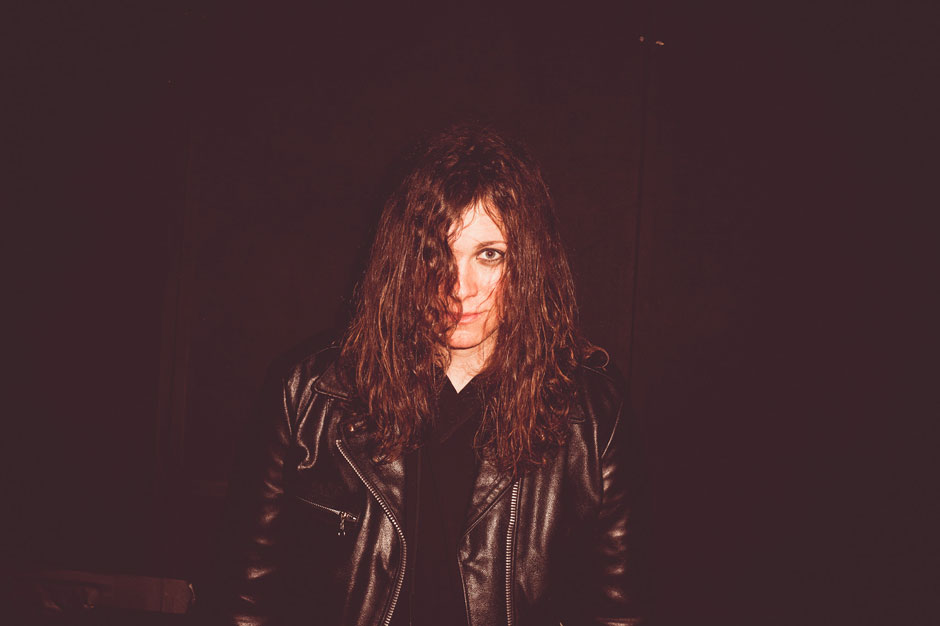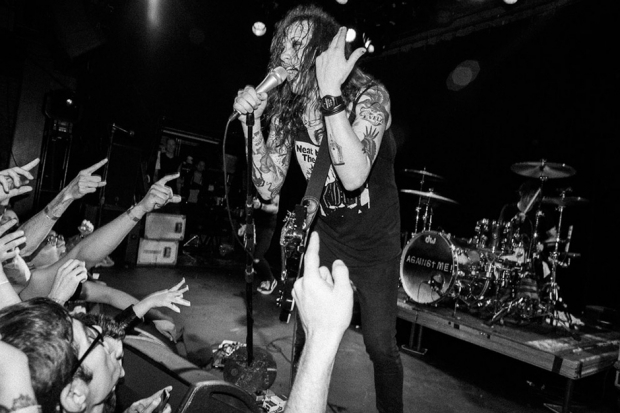Halfway through a reliably galvanizing Against Me! set last week at Brooklyn’s Williamsburg Hall of Music, singer-guitarist Laura Jane Grace noted that, as usually happens whenever the relentless pop-punks hit the road in January, she’d come down with something (in this case, bronchitis), so if anyone was inclined to sing along, she’d appreciate the help. Judging by the copious hugging/stage-diving that ensued, the worshipful crowd was only too happy to oblige, but based on recent history, Grace would have found a way to push through regardless.
In a May 2012 interview with Rolling Stone, the singer and guitarist formerly known as Tom Gabel revealed her lifelong battle with gender dysphoria and announced that she intended to start living life as a woman. Shortly after the piece ran, Against Me! began a summer tour opening for the Cult, on which they debuted instantly anthemic early versions of “True Trans Soul Rebel” and “Transgender Dysphoria Blues,” which chronicled Grace’s struggle to feel comfortable in her own skin. The new songs seemed to indicate another vibrant chapter for the group that made New Wave — a.k.a. SPIN’s 2007 Album of the Year — but things immediately went south from there. During the initial sessions for the Florida-born band’s new album, both drummer Jay “Son of Max” Weinberg and longtime bassist Andrew Seward left the group; to top it off, a tree fell on Grace’s studio.
But Against Me! rebounded, recruiting Rocket From the Crypt and Offspring drummer Atom Willard and NOFX bassist Fat Mike to complete Transgender Dysphoria Blues; Refused/(International) Noise Conspiracy bassist Inge Johansson now rounds out the current lineup. After working with Butch Vig and Billy Bush on the major-label albums New Wave and 2010’s White Crosses, Grace produced Blues with mixing help from Bush, and is releasing it on her own label, Total Treble. She says the process almost broke her and ended the band, but the result is one of the most incisive and life-affirming rock albums of the ’10s.
Speaking on the band’s tour bus a few hours before the show (and a few minutes before the estrogen shot that she gives herself every Thursday), Grace talked about recovering from lineup shake-ups, and why she was determined to finish what she started.
So it’s been four years since your last album. What took so long?
Well… I mean….
I’m joking, of course.
Right, right. Well, the process of releasing White Crosses was an odyssey in and of itself. That record came out — I want to say in July of 2010 — and it leaked a couple months before, and then it came out, and it was out for not even six months, when Warner kind of fell apart and (former Warner Bros. head) Tom Whalley was ousted as President, and (former Island/Def Jam President) Lyor Cohen came in and fired basically our whole staff. So we got our record back and rereleased it again in 2011 and went on tour in support of it. We went on tour for a while in support of that record, probably two years straight on the road. And then the making of this record has taken a while. And we’ve been touring the whole time, too, while making the record.
It seems like you’re always on the road.
Well, we don’t really have the financial option not to be.
After you came out in that Rolling Stone article two years ago, what has life been like for you?
This summer — and finishing this record was a part of it, too — was when I really felt like I was being spit out the other end of it, like, “Whoa, that really all just happened.” [Laughs] You go into defense mode in a weird way. Because it’s not even just your friends who are all in bands, it’s your redneck neighbors who are coming over saying they read an article about you, and it’s really personal stuff. It was a weird experience in a lot of ways. That first year and a half, it was really putting up blinders and putting up your defense mechanisms and really focusing heavily on trying to finish a record that took a while to finish, and had one thing happen after another that stopped it from finishing. There was a certain amount of really getting lost in that and focusing on that, and when I was finished, I was like, “Oh wait — this is life. Now what do I do?”
At the same time, there was a lot happening inside your band. Both Jay and Andrew, who had been with the band for about a decade, left during the sessions. I believe that I read that you ended up recording the album three times, overall. Is that right?
Well, two times, really. The first time was kind of a false start where we did a bunch of the basics, like drum tracks and stuff like that, and it was good, but we just didn’t really have fun while we were doing it. We did it right before a tour, came back from the tour, and we all agreed, “That wasn’t cool, let’s just scrap that,” and we started again. And then we basically got to the point where everything was finished but the vocals, and so that was when Jay quit, and we were like, “Oh, fuck. Okay, now we have to go and re-record the drums.” Initially, we tried the approach of having Atom record drums to the pre-existing guitar tracks, because so much work had gone into it, which didn’t work. It just sounded off, you know? It didn’t lock in right. So then we recorded with Atom. We started from scratch.
What happened with Jay? I know he was a big fan before he joined, and he always seemed so thrilled to be in the band. When I saw him play with the band, he was always mouthing the lyrics while drumming.
To be honest, I have no idea. He never said a word. I just woke up one morning and read on Twitter that he was leaving the band.
Really?
Never talked to him since.
Do you think he was weirded out by your transition or all the…
I have no idea. I have no ability to hypothesize about it. You would really just have to ask him.
And how about with Andrew? What happened there?
I mean, Andrew, it’s way more complicated. Obviously, having played together for ten years in a band with him, from what we talked about, I think he just got to the point where he wanted to be in a position where he was spending more time with his family, and the way the band was happening and the amount of time being on the road… he has a kid, I have a kid, [guitarist] James [Bowman] has a kid. Being away from that, I just don’t think he was really happy, and it just built to that point, and I totally respect that.
As this was happening, did you feel any sort of pressure, like, “This has to be a great album”? Because when the news about your transition came out, it seemed like people were mostly supportive, but there certainly were a lot of questions about what this meant for the future of the band.
Well, there was that pressure initially, but once the songs were there, and I knew, “Okay, this is going to be the record, more or less, between these ten to 15 songs” — then that shit started happening. Then it was more about, “I know these songs are good enough that they have to reach a record. I have to, at the very least, finish the record, no matter what happens.” And it became more about that, and not knowing what was going to happen beyond that. But now being here and being on tour, obviously, and still having a band, feels pretty good. But definitely, the record almost killed the band. One hundred percent.
Was the future of the band ever in doubt? Did you ever think, “We might just release this and be done”?
For sure. I thought maybe we would just finish it. The ending of the recording, specifically, was so fucking bleak. The place we were recording, Earth Sound, is a pro studio and has great gear, and the lead engineer is awesome, but the scene is, you know, south Georgia. I’m being told I’m going to hell by bagboys in grocery stores; Lee the engineer records with a fucking gun on his hip, and the studio is built in an old auto garage that’s completely painted black. [Laughs] So, it’s just, you’re hiding in Valdosta, Georgia, where’s it’s so bleak. And it’s just me and James. And it got to the point where I had a fucking nervous breakdown. I was just like, “somebody needs to bring some fucking Valium to the studio right now or I’m not going to be able to record guitars today because I can’t stop shaking.”
Not only were you going through all that, but you also produced the album, and you released it on your own label. What made you decide to take the reins?
I definitely wanted a different experience than the major-label experience, having done that for the past two records. The team of people we worked with on the last couple of records, Butch Vig and Billy Bush, we’d become close with, but there was no way we could work with them again on this record. And I knew I couldn’t go into some studio with people I didn’t know, an engineer I didn’t know, a house person I didn’t know, a producer I didn’t know, and work out the things that I was working out in the lyrics in front of them. I needed to protect myself and kind of cocoon up.
As far as releasing the album yourself, what made you decide to do that? Because you probably could have gone with any number of independent labels.
There were some options, yeah, but it felt weird. We came off that whole thing, and people didn’t really look at us like we had any value, or we were worth anything, and that was the kind of vibe I kept getting from people: “Oh, you’re finished.” It was frustrating, especially because it was like, “Okay, I get it, White Crosses didn’t do that well sales-wise, but you’re really going to judge a band by that? The songs are solid. Tell me they’re not.” To feel like you’re just that disposable, it made me angry, and it made me feel like I had something to prove in a lot of ways.
Looking back at your major-label experience, what do you think? Was it the right move for the band, or do you feel weird about it?
I think just for the chance to work with Butch Vig for two records alone, it was 100 percent worth it, and I would do it ten times again.
Some people have wondered if “Black Me Out” is supposed to be a response to…
I’ve seen that. And it’s not.
What is it about?
It’s an angry song, and it’s about feeling like you have certain relationships in your life where you have to fake the person that you are and be inauthentic and compromise yourself to people you work with or people you see out at a bar who corner you — who make you the kind of person that you aren’t, really — and feeling like you’re so angry that you just want to be like blacked out from someone’s existence, like, “Fucking forget about me, don’t think about me anymore, I do not exist to you anymore.” That kind of feeling.
One of the great themes of your writing career is the way the punk underground fails you and other people and is filled with hypocrisy. “Drinking with the Jocks” seems like your ultimate statement on this so far. Is that a correct reading?
Maybe, but maybe not. That song, in particular, was inspired by a night where I wasn’t necessarily hanging out with punks. It’s more self-criticism of knowing that, okay, I’m a transexual, but no one else in this circle of people here knows that, and everyone else is laughing at faggots and everyone’s being homophobic, and you’re laughing along, too, and you’re lying to yourself. It didn’t necessarily have anything to do with punk rock, but at the same time, just being that I’ve played in a punk band for as long as I have, a lot of my experiences, of course, are going to be around that world or are related to that, and I have seen an unfortunate amount of, be it sexism or homophobia or whatever, in the punk-rock world, where people are like, “I’m not really racist, but here’s a racist joke” or “I’m not really homophobic, but here’s a homophobic joke.” And it’s a shame to laugh along.
It must have been difficult to write these lyrics as people were leaving your band, wondering who was going to accept you as a person after coming out. Was wondering how people were going to accept Laura instead of Tom one of your primary concerns?
Well, yeah, sure. Those are the fears you go through when you transition. You don’t necessarily know the person that you’re going to end up looking like or who you’re going to end up as. And that being said, I’m still in transition. My life is in a state of flux right now where I don’t really know where it’s going to come out on the other end. That’s terrifying.






